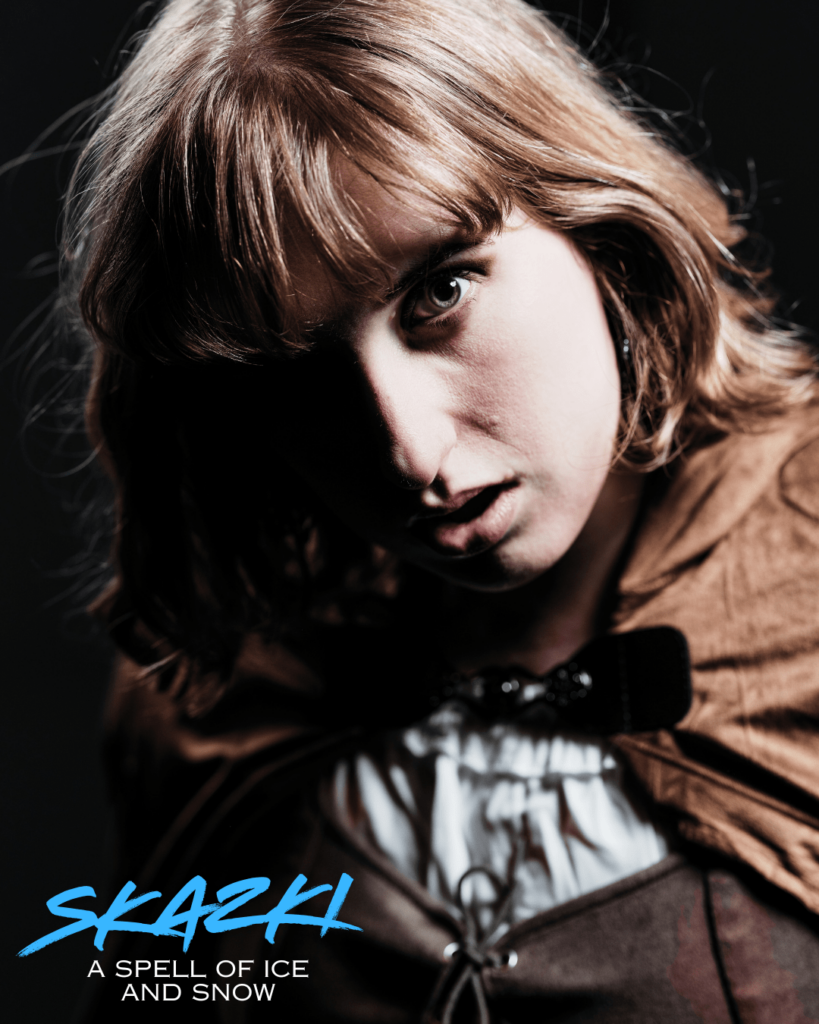
‘Skazki: Spell of Ice and Snow.’ Written by J.X.M. Corriss. Words and Music by Jonathan Blackshire. Musical Direction by Sam McLoughlin. Directed by Sean Robinson. Choreography by Katie Formosi. Costume Design by Kitty Prue. Lighting Design by Nick Tavares. Stage Management by Max Cavanaugh, assisted by Mason West. Presented by Mystic Evidence Productions at the Boston Center for the Arts, 539 Tremont St, Boston, MA 02116
By C.J. Williams
“Culture is also a casualty of war.” So what’s culture? And is its loss akin to losing a limb – or a family member?
Skazki: A Spell of Ice and Snow recently wrapped up its run at the Boston Center of the Arts. The brand-new musical, written by a first-time playwright (but veteran poet and novelist, X.M. Corriss), is a whimsical musical with a cold as steel fairy tale edge, and where it may falter in pacing, it more than evens out in its cast and crew’s passionate performances. If culture is indeed a casualty of war, Skazki is perhaps the result of artists who know that all art is a kind of healing.
Based loosely on Russian folk tales, the production follows a peasant girl, Katya (Liza Robinson), through an endless winter. She is on a quest to find magic or medicine for her freezing family, and on the journey, she gains a friend in the freezing, semi-amnesiac soldier, Ivan (Charles Wainwright), a questionable ally (in a witch), and two antagonists – Koschei the Deathless and Lord Morozko, “Winter” himself.
But why, other than the fact that this is Russia in the winter, is the cold so bitter? And why is it seemingly endless? The plot points spool out as the cast moves slowly through the ice, and enthusiastically through the music. We learn in this mythic world, perhaps not so very different from our own, that winter is owed “respect” and that, for less-well-defined reasons, the only answer to “are you cold?” must be “no.”
This fairy tale directive remains the primary tension and test for the heroes, and Katya hangs on doggedly. But after visiting the witch Baba Yaga, she loses Ivan – who succumbs to a deceptive and ruthless Koschei’s verbal gymnastics comparable to the snake in the proverbial garden of Eden.
Themes of memory, friendship, fear, life and death, war and identity – they nest in this piece of stagecraft like a matryoshka doll. And the music, composed and arranged by Sam McLoughlin, travels a taut line between agelessness and immediacy, with echoes of recent folk hits like “Hadestown.” But these themes are uniquely personified by the characters and cast. Koschei, played by director Sean Robinson, was a particularly persuasive walking-and-singing mixture of death, chaos, and defiance. Absolutely delightful, Abbie Ansderson’s Baba Yaga puts a mask on the theme of identity – a trickster woman who ends up having more to her story than you first expect. And Wainwright’s Ivan allows us to see the faceless confusion, the stripping of our humanity, always committed by war. But perhaps the defining thread throughout is that of cycles, that there is a time for everything and an order to our time within time…and that Koschei, in his imprisonment of death, has stopped the flow of life as well. We eventually discover why the winter will not end; and why the Lord of Winter (Sam David Cohen) is so dead set on freezing the poor souls crossing his land, but it is the questions, as in any good story, that stand tallest in Skazki.
Story and culture, fairy tales and snow-wrapped worlds — and if we go the route of Koschei, can we lose them all? Alternately, if we follow Baba Yaga and Lord Morozko, or Katya…? Skazki stages both questions, and a potential answer. As Baba Yaga sings, “Every story has a key.” But what it also provides is a place to wonder and to rest. “We are Russians,” says Katya more than once, “All we have are stories…” But a story is always at the root of new life.

